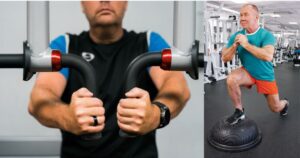Protein and Nutrtion Training After 70: The Key to Aging Strong and Living Longer:

As people age, the focus on health often shifts from appearance to strength, mobility, and longevity. For many Americans entering their 70s, maintaining energy, balance, and muscle mass can seem challenging. But science and real-life examples show that protein and nutrition training after 70 can completely change how you age — helping you stay active, independent, and full of life.
One inspiring story making headlines is that of a 71-year-old fitness coach who credits her vitality to a simple routine — eating enough protein and lifting weights. This isn’t just a personal success story; it’s backed by solid science showing how muscle health and diet play a direct role in aging gracefully.
Why Protein and Strength Training After 70 Matters:
After age 70, the body naturally starts losing muscle mass — a condition known as sarcopenia. This process can make daily activities harder and increase the risk of falls or weakness. However, studies show that older adults who regularly do strength training and eat a protein-rich diet maintain their muscle mass, improve balance, and feel more energized.
The Science Behind Protein and Muscle Repair:
Protein helps rebuild and repair muscle tissue after exercise. When you perform resistance or weight training, tiny tears form in your muscle fibers. Consuming adequate protein helps these fibers rebuild stronger than before. According to a report from the National Institutes of Health, older adults often need slightly more protein than younger adults to maintain muscle health.
How Strength Training Supports Longevity:
Strength training isn’t just about lifting heavy weights — it’s about improving bone density, boosting metabolism, and keeping your body capable. Regular resistance workouts have been shown to improve insulin sensitivity, lower inflammation, and enhance heart health — all key factors that support longevity after 70.
Recommended Protein Intake for Older Adults:
Experts suggest that adults over 70 should aim for around 1.0 to 1.2 grams of protein per kilogram of body weight each day. This means if you weigh 70 kilograms (around 154 pounds), your daily protein target should be roughly 70–85 grams. That might sound like a lot, but it’s easy to achieve with balanced meals throughout the day.
Easy Ways to Add Protein to Your Diet:
You don’t have to rely on protein powders or supplements. Real, whole foods can give you plenty of nutrition. Some great options include lean meats, eggs, dairy, beans, tofu, lentils, fish, and Greek yogurt. Including a small portion of protein with every meal helps older adults maintain steady energy levels and prevent muscle loss.
Timing Your Protein for Better Results:
One trick that fitness experts recommend is spreading your protein intake evenly throughout the day instead of eating most of it at dinner. Having protein at breakfast and lunch gives your muscles the nutrients they need for ongoing repair and growth, especially when paired with strength training sessions.
Safe and Effective Strength Training Tips After 70:
Weight training after 70 can be safe and highly beneficial when done correctly. The goal isn’t to lift the heaviest weights but to train consistently with proper form. Before starting, older adults should check with their healthcare provider or a qualified trainer to ensure they’re using the right techniques for their fitness level.
Start Slow, Focus on Form:
Begin with light resistance bands or bodyweight exercises. Gradually increase the intensity as your muscles adapt. Exercises like squats, wall push-ups, seated leg raises, and light dumbbell curls can make a big difference in muscle tone and joint flexibility.
Include Balance and Mobility Work:
Balance and coordination are equally important as muscle strength. Try adding yoga, stretching, or gentle Pilates movements into your weekly routine. These activities not only improve posture but also prevent injuries and stiffness.

Longevity Benefits Beyond Physical Strength:
Building muscle and eating more protein have benefits that go far beyond looking fit. Studies show that older adults who stay active and meet their protein needs often experience better brain function, improved sleep, and a stronger immune system.
Boosting Mental and Emotional Health:
Exercise increases the release of endorphins — the “feel-good” hormones that reduce stress and anxiety. For many older adults, strength training provides a sense of confidence and independence that positively affects mental well-being. A recent article by Healthline highlights how resistance training may also reduce the risk of cognitive decline.
Social and Emotional Connection:
Group fitness classes or home workouts with friends can also support emotional health. Many seniors find motivation and happiness in staying socially engaged while working toward their fitness goals.
Combining Nutrition and Movement for Long-Term Health:
The secret behind lasting strength isn’t one single habit — it’s the combination of balanced nutrition, consistent exercise, and a positive mindset. By focusing on protein and nutrition training after 70, older adults can enjoy more energy, better posture, improved balance, and a longer, healthier life.
Consistency Is Key:
Progress doesn’t happen overnight. Even small, steady improvements — like adding an extra workout per week or increasing your daily protein slightly — can deliver incredible long-term results. Remember, it’s about sustainability, not speed.
Listening to Your Body:
Rest and recovery are just as important as the workouts themselves. Older adults should always give their bodies time to recover and avoid overtraining. Hydration, proper sleep, and gentle stretching all contribute to maintaining energy levels and avoiding fatigue.
Final Thoughts:
Healthy aging isn’t about slowing down — it’s about moving smarter and nourishing your body better. The story of the 71-year-old fitness coach serves as proof that it’s never too late to build strength and vitality. Whether you’re new to exercise or already active, prioritizing protein and strength training after 70 can truly transform how you feel and live.
Quick Summary: Protein and Strength Training After 70:
- Why is protein and strength training important after 70?
Aging leads to natural muscle loss (sarcopenia). Regular strength training and protein intake help maintain muscle mass, mobility, and independence. - How does protein help seniors stay strong?
Protein repairs muscle fibers damaged during exercise. It supports recovery, builds lean mass, and helps regulate energy and appetite in older adults. - What are the best protein sources for people over 70?
Lean meats, eggs, Greek yogurt, fish, lentils, tofu, beans, and dairy provide essential amino acids for muscle repair and strength. - How much protein do adults over 70 need daily?
Experts recommend around 1.0–1.2 grams of protein per kilogram of body weight daily — roughly 70–85 grams for most seniors. - Why combine protein with strength training?
Resistance exercise enhances the muscle-building effect of protein, improving strength, balance, bone density, and overall health. - Safe strength training tips for seniors:
– Start with light resistance bands or bodyweight exercises
– Focus on correct form and gradual progression
– Include balance, flexibility, and mobility exercises
– Rest and recover between workouts - Additional longevity benefits:
Strength training supports heart health, brain function, and emotional well-being. It also helps reduce inflammation and improve sleep quality. - Is heavy lifting safe after 70?
Yes — when done under supervision and with proper technique. The goal is consistency, not maximum weight. - What role does mental health play in aging strong?
Regular exercise releases endorphins, reduces anxiety, boosts confidence, and helps older adults stay socially and emotionally active. - Simple ways to maintain progress:
– Eat balanced protein meals throughout the day
– Stay hydrated and get enough sleep
– Track your workouts and celebrate small wins
– Stay consistent — steady effort leads to long-term results - Key takeaway:
Building strength and eating enough protein are not just fitness habits — they are longevity strategies. Protein and strength training after 70 help older adults stay stronger, sharper, and happier for years to come.
Frequently Asked Questions (FAQs):
1. How much protein should a 70-year-old eat daily?
Most experts recommend around 1.0 to 1.2 grams of protein per kilogram of body weight. For a 70 kg adult, that’s roughly 70–85 grams daily.
2. Can strength training really be safe after 70?
Yes, when done with proper technique and supervision. Start with light weights or resistance bands and focus on correct form and balance exercises.
3. What are the best protein sources for older adults?
Eggs, fish, lean meat, Greek yogurt, beans, tofu, and lentils are excellent sources of high-quality protein for seniors.
4. How often should seniors do strength training?
Aim for two to three sessions per week, giving your muscles at least one rest day between workouts.
5. Does protein and strength training really improve longevity?
Research shows older adults who stay active and eat enough protein tend to maintain independence longer, have stronger bones, and enjoy better quality of life.
6. Should seniors take protein supplements?
Whole food sources are best, but a doctor-approved protein powder can help if dietary intake is low. Always consult a healthcare provider first.
7. What time of day is best for strength training after 70?
Morning or early afternoon workouts are generally ideal because energy levels and coordination are higher.
Conclusion:
Staying strong and independent after 70 is absolutely possible with the right combination of nutrition and movement. Regular protein and strength training after 70 not only keeps muscles and bones healthy but also supports heart health, brain function, and emotional well-being. The journey to longevity doesn’t require extreme diets or heavy workouts — just consistency, balance, and a positive mindset. Remember, it’s never too late to start feeling stronger, more confident, and full of energy again.
Disclaimer:
This article is for general informational purposes only and is not intended to provide medical or professional health advice. Always consult a qualified healthcare professional before making any major changes to your diet or exercise routine. The views expressed here are based on public research and educational sources only.
For more details, please visit our full Disclaimer Page.
Related Topics You May Also Like:
About the Author
This article is written by the VitaGlowZenith Editorial Team. We provide easy-to-understand, evidence-based wellness tips to help you make better health and lifestyle choices.
